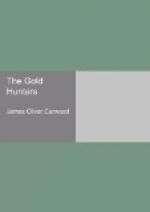A Story of Life and Adventure in the Hudson Bay Wilds
By
James Oliver Curwood
1909
To the sweet-voiced, dark-eyed little half-Cree maiden at Lac-Bain, who is the Minnetaki of this story; and to “Teddy” Brown, guide and trapper, and loyal comrade of the author in many of his adventures, this book is affectionately dedicated.
CHAPTER I
THE PURSUIT OF THE HUDSON BAY MAIL
The deep hush of noon hovered over the vast solitude of Canadian forest. The moose and caribou had fed since early dawn, and were resting quietly in the warmth of the February sun; the lynx was curled away in his niche between the great rocks, waiting for the sun to sink farther into the north and west before resuming his marauding adventures; the fox was taking his midday slumber and the restless moose-birds were fluffing themselves lazily in the warm glow that was beginning to melt the snows of late winter.
It was that hour when the old hunter on the trail takes off his pack, silently gathers wood for a fire, eats his dinner and smokes his pipe, eyes and ears alert;—that hour when if you speak above a whisper, he will say to you,
“Sh-h-h-h! Be quiet! You can’t tell how near we are to game. Everything has had its morning feed and is lying low. The game won’t be moving again for an hour or two, and there may be moose or caribou a gunshot ahead. We couldn’t hear them—now!”
And yet, after a time one thing detached itself from this lifeless solitude. At first it was nothing more than a spot on the sunny side of a snow-covered ridge. Then it moved, stretched itself like a dog, with its forefeet extended far to the front and its shoulders hunched low—and was a wolf.
A wolf is a heavy sleeper after a feast. A hunter would have said that this wolf had gorged itself the night before. Still, something had alarmed it. Faintly there came to this wilderness outlaw that most thrilling of all things to the denizens of the forest—the scent of man. He came down the ridge with the slow indifference of a full-fed animal, and with only a half of his old cunning; trotted across the softening snow of an opening and stopped where the man-scent was so strong that he lifted his head straight up to the sky and sent out to his comrades in forest and plain the warning signal that he had struck a human trail. A wolf will do this, and no more, in broad day. At night he might follow, and others would join him in the chase; but with daylight about him he gives the warning and after a little slinks away from the trail.
But something held this wolf. There was a mystery in the air which puzzled him. Straight ahead there ran the broad, smooth trail of a sled and the footprints of many dogs. Sometime within the last hour the “dog mail” from Wabinosh House had passed that way on its long trip to civilization. But it was not the swift passage of man and dog that held the wolf rigidly alert, ready for flight—and yet hesitating. It was something from the opposite direction, from the North, out of which the wind was coming. First it was sound; then it was scent—then both, and the wolf sped in swift flight up the sunlit ridge.




